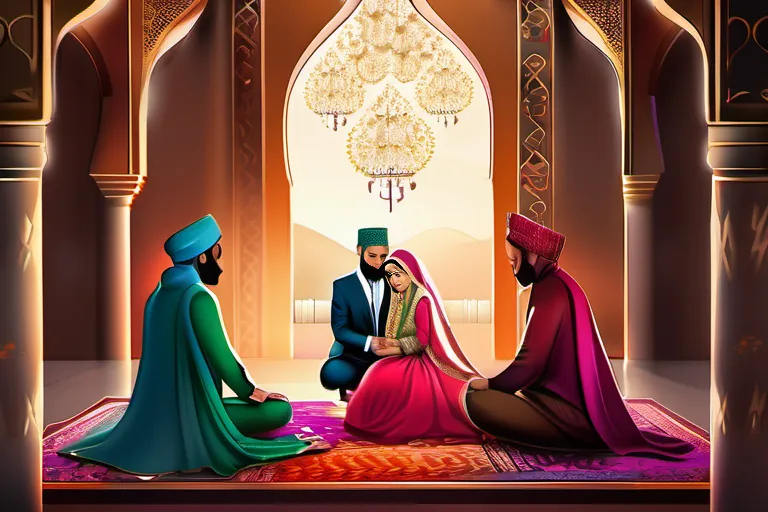Explore the fundamentals, practices, and significance of Muslim marriage in this detailed guide.
Muslim marriage, also known as Nikah, is a sacred institution in Islam that unites two individuals in a lifelong partnership. This article delves into the intricacies of Muslim marriage, providing valuable insights for those seeking to understand its significance and practices.
The Significance of Muslim Marriage
Imagine marriage as a grand tapestry, woven together by the threads of love, commitment, and mutual respect. In Islam, marriage is not just about finding someone to share your life with; it’s about building a sanctuary where souls find peace and purpose. So, why does this institution hold such profound significance in Muslim communities?
For starters, marriage in Islam is seen as an act of worship, duty, and partnership. It’s not just about finding love; it’s about fulfilling one’s spiritual responsibilities. When two individuals come together, they embark on a journey to build a harmonious home where both can grow spiritually and personally.
Moreover, the social fabric of any community is strengthened through marriage. Families unite, creating a web of relationships that support not just the couple but an entire network of relatives. Marriage in this context becomes a vehicle for social cohesion, bridging gaps between different communities and fostering understanding and respect.
From a psychological standpoint, marriage offers numerous benefits. It provides emotional security and stability, which are crucial for both the individuals involved and their potential children. Studies have shown that married couples often experience better mental health and longevity due to the support systems they provide each other. In essence, marriage in Islam is a holistic endeavor that impacts every aspect of life.
But what makes Muslim marriages truly unique? The emphasis on adl (fairness) and nisaab (minimum amount for dowry), which ensure financial security for the wife, are just two examples. These practices reflect a deep understanding of human dignity and equality within the marital relationship.
In conclusion, Muslim marriage is more than a legal contract; it’s a sacred bond that enriches both individuals and society as a whole. By embracing its principles, couples can build homes where love thrives, families flourish, and communities grow stronger. So, how will you contribute to this beautiful tapestry of life through your own marriage?
The Islamic Perspective on Love and Marriage
Imagine love as a garden, where two souls decide to plant their hearts together. But how does Islam view this beautiful bond? Is marriage merely a legal contract, or is it something more profound? In Islam, love and marriage are not just about romantic feelings but also about companionship and support in life’s journey.
The Quran emphasizes the importance of choosing a spouse based on mutual respect, compatibility, and good character. Can you imagine marrying someone who lacks these qualities? Wouldn’t it be like planting seeds that cannot grow into a fruitful tree?
Muslim teachings suggest that marriage is a sanctuary for love and intimacy, a place where two individuals can find comfort and joy. It’s not just about sharing a room; it’s about creating an environment of trust, care, and understanding. Is this not what we all desire in our personal relationships?
The Prophet Muhammad (peace be upon him) said, “When a man marries a woman, he makes partners with her in half of his property.” This means that the husband is responsible for providing for his wife and ensuring her well-being. Isn’t this a powerful statement about mutual respect and shared responsibility?
Muslims believe that marriage should be based on the principle of nidaa’ al-qurbah, which means seeking nearness to one another. This doesn’t just refer to physical proximity but also emotional closeness, where two hearts beat as one. Can you think of a stronger bond than when two people are so close that they feel each other’s pain and joy?
Finally, in Islam, marriage is seen as a means to seek peace and happiness on Earth. It’s not just about finding a partner; it’s about entering into a relationship where both parties can grow spiritually and emotionally. Is this not the ultimate goal of every relationship we aspire for?
As you explore the Islamic perspective on love and marriage, remember that it is a beautiful blend of personal fulfillment and societal contribution. It’s about creating a home where love and respect flourish, just as a flower thrives in its carefully tended garden.
The Essentials of a Muslim Wedding Ceremony
When we think about Muslim marriage, it’s like navigating through a beautiful tapestry woven with rich cultural threads and Islamic teachings. A Muslim wedding ceremony, in particular, is a fascinating blend of tradition and modernity, much like a vibrant mosaic that captures the essence of unity and commitment.
At the heart of any Muslim wedding lies the Nikah, the marriage contract. This is where two souls promise to join their lives together under the guidance of Allah. It’s not just about exchanging vows; it’s about making a solemn declaration in front of witnesses, ensuring that the union is sanctified and protected by divine laws. Imagine the Nikah as the sturdy foundation of a house, built with care and intent.
Mahr, or dowry, is another significant aspect of the marriage contract. While its practice can vary, the core idea remains the same: it’s a gift from the groom to his bride, symbolizing his commitment to her well-being. It’s like planting a seed in the ground; what grows will be nourished by the care and effort invested. Mahr ensures that both parties enter into marriage with a sense of mutual respect and dignity.
The Walimah, or wedding feast, is perhaps one of the most joyous moments. It’s a celebration not just for the couple but also for their families and communities. This grand gathering often includes feasting, dancing, and traditional attire, creating an atmosphere of festivity and unity. Think of it as a bridge connecting two families, with every handshake and smile strengthening this bond.
Each element of a Muslim wedding ceremony serves to reinforce the principles of love, respect, and commitment that underpin the institution of marriage in Islam. From the Nikah to Mahr and Walimah, these practices are not mere rituals but deeply meaningful acts that lay down the groundwork for a successful and fulfilling partnership.
The Rights and Responsibilities of Spouses
The rights and responsibilities of spouses in a Muslim marriage, as outlined by Islamic law, are intricate yet beautifully balanced. Imagine a seesaw that must be perfectly level for harmony to reign; this balance is seen in the relationship between husbands and wives. Does it surprise you that both parties have specific rights and duties?
For the husband, his primary responsibility is to provide financial support (nafaqah) to his wife. This includes her basic needs such as food, clothing, shelter, and healthcare. In essence, he is seen as the steward of the household resources. However, it’s not just about money; emotional support and maintaining a loving atmosphere are equally important. Could you imagine how challenging this responsibility can be without clear guidance?
The wife, on her part, has several rights that include respect, protection, and sharing in decision-making processes within the family. She is also entitled to her Mahr, which is a form of dowry given by the groom at the time of marriage. This act symbolizes the husband’s commitment to provide for his wife, not as a burden but as a privilege. Isn’t it remarkable how this practice ensures mutual respect and fairness?
Mutual consent in making decisions is crucial; both partners should communicate openly and honestly about their needs and desires. This can often be seen as a challenge in today’s fast-paced world, where time seems scarce and communication tools can sometimes create misunderstandings. How do you ensure that your relationship remains strong amidst the noise of modern life?
The balance between these rights and responsibilities is not just about fulfilling legal obligations but fostering a deep emotional connection. It’s like building a bridge over turbulent waters; both parties must work together to maintain its integrity. Do you think this understanding can enhance the stability and joy in your relationship?
Marital Relations and Intimacy in Islam
Exploring marital relations and intimacy within the framework of Islam can be quite enlightening, especially when considering how these dynamics intertwine with personal and spiritual growth. In Islamic teachings, marriage is seen not just as a union between two people but also as a sacred bond that brings together families and communities. How do couples navigate this intricate web of responsibilities and desires?
One might wonder: What exactly does marital intimacy mean in the context of Islam? It goes beyond physical pleasure; it encompasses emotional support, mutual respect, and spiritual connection. The Quran speaks about mutual satisfaction and comfort between spouses, highlighting that a marriage should be filled with love and kindness.
Consider the metaphor of two hands holding each other tightly—both supporting and complementing one another. This reflects how partners in a Muslim marriage should see themselves: as integral parts of a whole, working together towards common goals and understanding. In Islamic teachings, this includes the concept of nikah, which emphasizes that marital relations are not just about pleasure but also about nurturing each other’s souls.
How do couples achieve this balance? The answer lies in open communication, mutual respect, and a willingness to understand each other’s needs. It is essential for spouses to maintain an environment of trust where both can express their desires and concerns freely. This openness not only strengthens the bond but also deepens the emotional connection, making every moment spent together more meaningful.
Moreover, practicing patience and forgiveness becomes crucial in navigating challenges that may arise in a marriage. Just as rivers find their way through rocky landscapes to reach the sea, couples must learn to adapt and find new paths when faced with obstacles. This resilience is not just beneficial for maintaining harmony but also contributes significantly to spiritual growth.
Divorce and Remarriage in Islam
When we delve into the process of divorce and remarriage in Islam, it’s like exploring the intricate patterns of a delicate tapestry woven over centuries. How many times have you pondered about the conditions under which marriage can be dissolved? In Islamic law, or Sharia, the concept is rooted deeply in maintaining justice and ensuring the welfare of both parties involved.
According to Islamic teachings, divorce (talaq) should be approached with utmost care and understanding. The process often starts with efforts to reconcile between the couple. If reconciliation fails, a wife may seek a legal divorce through a court or by following specific procedures that ensure fairness. The emotional and social implications of such decisions can be profound; both parties are navigating uncharted waters, trying to find solace and strength in faith.
Once a divorce is finalized, the question of remarriage arises. Here again, we see a balance struck between personal freedoms and societal responsibilities. Remarriage is encouraged if both parties choose it, provided that certain conditions are met. These include ensuring the financial stability of any potential new family unit, as well as maintaining the sanctity and respect for each partner’s previous marriage.
The journey back to marital bliss or forming a new bond requires not just legal agreements but also emotional healing and personal growth. It’s a reminder that in Islam, reconciliation and second chances are highly valued, offering hope and renewal even after the most challenging times.
Conclusion
 In conclusion, Muslim marriage is a deeply spiritual bond between two individuals, rooted in mutual respect, love, and obedience to Allah. By understanding its principles and practices, we can appreciate the beauty and importance of this sacred institution in Islam.
In conclusion, Muslim marriage is a deeply spiritual bond between two individuals, rooted in mutual respect, love, and obedience to Allah. By understanding its principles and practices, we can appreciate the beauty and importance of this sacred institution in Islam.











